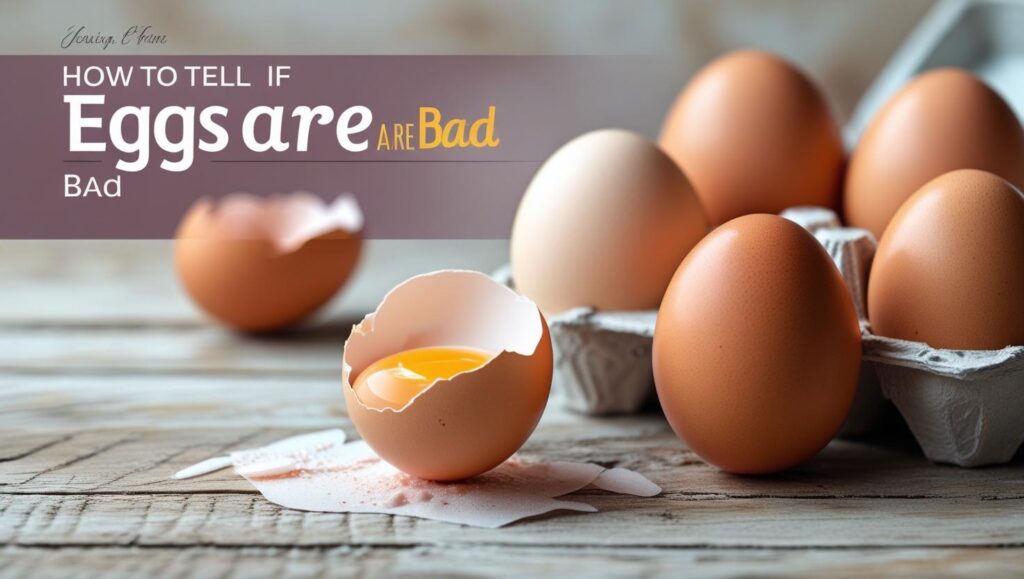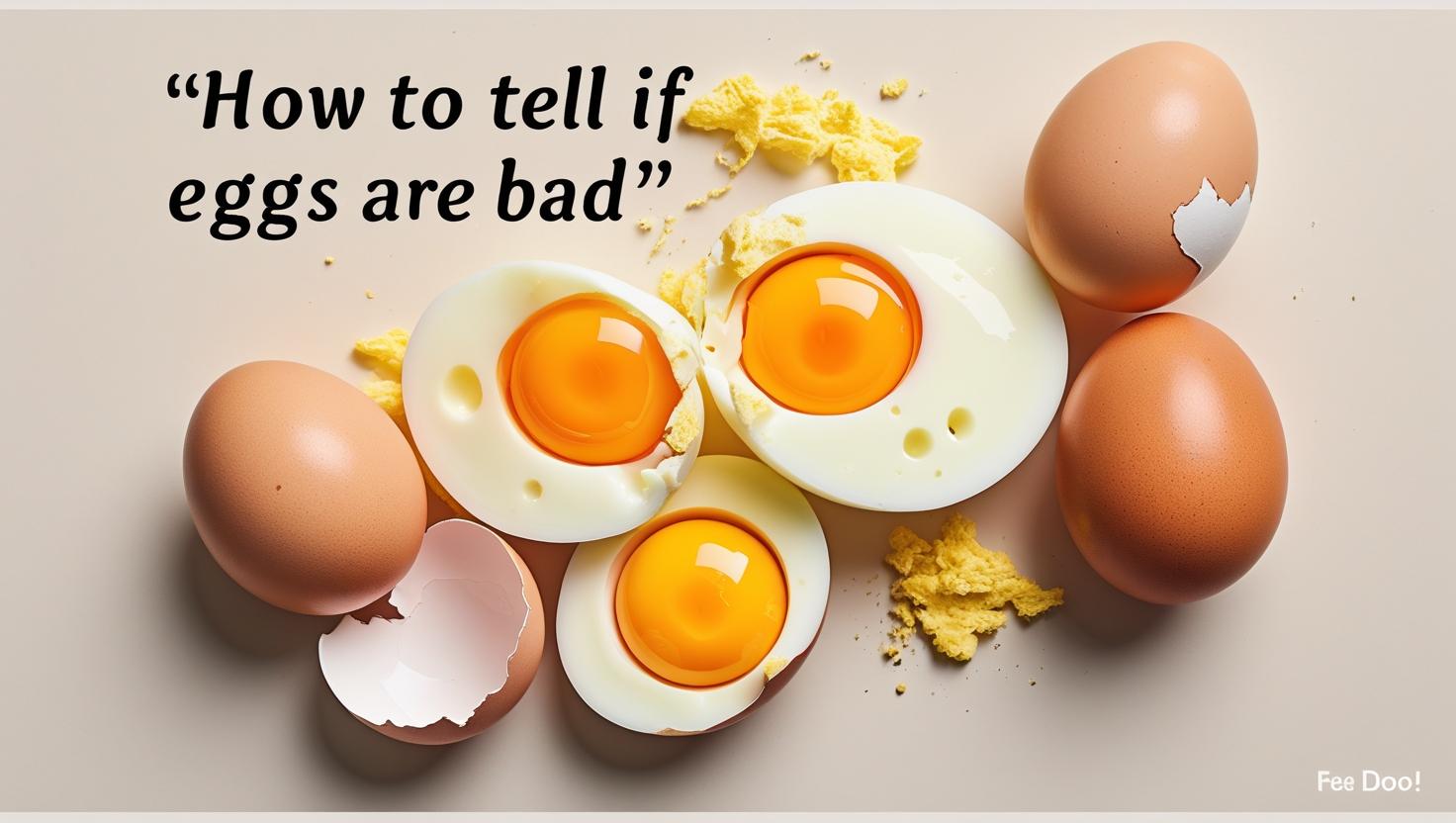The short answer? You’ll know how to tell if eggs are bad: float test, sniff test, or by simply cracking them open.
Eggs are a staple in many kitchens, used in a variety of meals from scrambled eggs to baking. But how do you know when they’ve gone bad? In this guide, we’ll explain the most reliable methods to tell if your eggs are still good or if it’s time to toss them. Eggs can last several weeks when stored properly, but you need to know how to check for signs of spoilage to avoid using bad eggs. Whether you’re unsure of their freshness or just want to ensure you’re eating safe eggs, this article is for you.
We’ll also share tips on how to keep your eggs fresh for as long as possible. Read on to learn the signs of a bad egg and how to test if eggs are good, including the famous float test, and more.
1. What Causes Egg Floats to Go Bad?
Eggs, like all perishable foods, have a shelf life. When eggs are fresh, they contain protective layers inside the shell that prevent bacteria from entering. However, over time, eggs begin to degrade due to natural processes. As eggs age, the air pocket inside the egg enlarges, and moisture and carbon dioxide are lost. This causes the egg to become less fresh, which makes it easier for bacteria to grow, leading to spoilage. The eggshell is porous, allowing air and bacteria to pass through, especially as the egg ages.
Knowing how eggs go bad helps you understand the methods for determining their freshness. This information will be useful for deciding if eggs should be used, stored longer, or tossed.
2. How Long Do Eggs Last?
The freshness of eggs depends on how they’re stored and the date they were laid. Unopened eggs from the store typically last about 3 to 5 weeks past their expiration date when kept in the refrigerator. However, eggs can last even longer if stored correctly. If you want to maximize the lifespan of your eggs, keep them in their original carton to prevent them from absorbing odors from other foods in the fridge.
After the expiration date, eggs may still be safe to eat for some time, but it’s important to know how to check their freshness. Typically, eggs will last up to 4 weeks after the sell-by date if stored properly, but once they start showing signs of spoilage, it’s best to discard them.

3. What Does the Float Test Tell You About Egg Freshness?
One of the most common ways to test if eggs are still good is the float test. Fill a bowl or cup with water and drop the egg in. The way the egg behaves in the water tells you about its freshness:
- Fresh Egg: A fresh egg will sink to the bottom and lie flat on its side.
- Slightly Old Egg: An egg that stands upright on the bottom or slightly tilts may still be good, but is on its way out.
- Bad Egg: An egg that floats to the top has gone bad and should be discarded. The larger the air pocket inside, the more buoyant the egg becomes.
The float test is a quick and reliable method for determining whether your eggs are still fresh.
4. How to Tell If Your Egg Sinks is Bad Using the Sink Test
Similar to the float test, the sink test is another way to test egg freshness. To do this, simply place your egg in a bowl of water. If the egg sinks to the bottom and lies flat, it is still fresh. However, if the egg floats, it is no longer good to eat. This happens because the egg’s air pocket has grown as the egg ages, making it buoyant.
While this test is not foolproof, it is still one of the easiest and most reliable methods to tell if an egg has gone bad. Always use the float or sink test before cracking open the egg.
5. What is the Sniff Keep Eggs Test and How to Use It?
Another simple test to determine if an egg is bad is the sniff test. This test involves cracking the egg open and smelling it. If it has a foul odor, the egg has gone bad and should be discarded. A rotten egg typically smells very sulfurous or unpleasant. Fresh eggs, on the other hand, have little to no smell.
Be cautious when cracking open an egg; if you notice any off-putting smells, don’t attempt to eat it. The sniff test is a foolproof way to confirm if an egg is safe to consume after it’s been cracked open.
6. How to Check an Eggs for Freshness by Cracking It Open
If you’re still unsure whether your eggs are fresh, cracking one open can help you determine their condition. When you crack an egg, look at the following signs:
- Fresh Egg: The yolk will be round and firm, and the egg white will be thick and not spread out much.
- Old Egg: The yolk will be flat and may break easily. The egg white will be runny and spread out, which is a sign that the egg is no longer fresh.
- Bad Egg: If the egg has any discoloration, such as green or pinkish hues, or shows signs of mold, it should be discarded immediately.
The visual and textural signs of a cracked egg can tell you whether it’s still safe to eat or has gone bad.
7. How to Tell If a Hard-Boiled Egg is Still Good

Hard-boiled eggs are often kept as a convenient snack or used in recipes, but how do you tell if they’re still good? To check a hard-boiled egg, perform the float test—if it floats, it’s no longer fresh. You can also check the shell for cracks, and if it has any, the egg is more likely to spoil faster.
Another way to check a hard-boiled egg’s freshness is by peeling it. A fresh hard-boiled egg will peel easily, while an older egg may be harder to peel, leaving more of the white attached to the shell.
8. Can You Eat a Bad Egg?
While it’s tempting to eat eggs past their expiration date, consuming bad eggs can lead to food poisoning or other digestive issues. Eating a bad egg increases your risk of getting sick from bacteria such as Salmonella. To stay safe, always check eggs for signs of spoilage before cooking or eating them. If an egg passes the float test, doesn’t smell bad when cracked open, and the yolk and white are still firm, it’s safe to eat.
9. How to Store Eggs for Maximum Freshness
To ensure your eggs stay fresh as long as possible, it’s important to store them correctly. Always keep eggs in their original carton in the coldest part of the fridge (not in the door). The eggshell is porous, so keeping them in the carton helps prevent odors from other foods from seeping in. It also keeps the eggs from absorbing moisture and becoming less fresh.
Avoid storing eggs outside the fridge, as this can speed up the aging process. Keeping eggs at a consistent temperature is key to extending their shelf life.
10. What to Do with Eggs That Are Past Their Expiration Date
Even though eggs are generally safe for some time past their expiration date, you should always perform freshness tests before using them. If they pass the float and sniff tests, they’re likely safe to eat. However, if they’ve passed these tests and you’re still unsure, it’s best to toss them to avoid any risk of illness.
Don’t rely solely on expiration dates; always check your eggs for signs of freshness, including the float test, cracking them open, and smelling them for any foul odors.

Quick Summary of How to Tell If Eggs Are Bad:
- Float Test: Eggs that float are bad and should be discarded.
- Sink Test: Fresh eggs will sink and lie flat at the bottom of the bowl.
- Sniff Test: A bad egg will have a strong, unpleasant odor when cracked open.
- Cracking Open: Fresh eggs have firm yolks and thick whites, while old eggs have runny whites and flat yolks.
- Hard-Boiled Eggs: Check by peeling and floating the egg—if it floats, it’s not fresh.
- Storage: Keep eggs in the original carton in the fridge to maximize freshness.
- Expiration Date: Eggs can last beyond the expiration date, but always test for freshness before use.
Now that you know how to tell if eggs are bad, you can confidently enjoy your eggs while ensuring they’re safe to eat. Use the float test, sniff test, and visual inspection to check for freshness, and remember to store eggs properly for longer shelf life.
Frequently Asked Questions (FAQ): Eggs Are Good or Bad
Q1.Tell If Eggs Are Good?
Eggs are good if they have no unpleasant odor, the shell is intact, and they pass the float test by sinking to the bottom of the water.
Q2. How do you know if an egg has gone bad?
An egg has gone bad if it smells rotten, floats in water, or shows signs of unusual color or texture when cracked open.
Q3. How do you tell if eggs are bad?
Eggs are bad if they have a sour smell, float during the water test, or show a slimy or cracked shell. The egg white may also be watery and runny.
Q4. Is the egg float test accurate?
Yes, the float test is accurate. Fresh eggs sink and lay flat, while bad eggs float due to increased air inside.
Q5. How do you tell if eggs are bad?
Bad eggs will have a foul odor, float in water, or show abnormal texture, such as runny whites and discolored yolks when cracked open.





